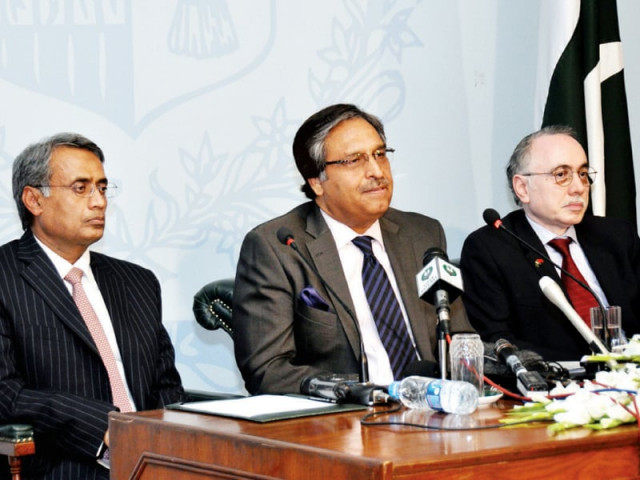Sticking to its guns: Islamabad reiterates drone strikes violate sovereignty
FO appreciates US President Obama’s statement that force alone can’t defeat terror.

Foreign Secretary Jalil Abbas Jilani addresses a press conference. PHOTO: NNI
A day after US President Barack Obama pledged to continue the controversial drone strikes, Pakistan, the main focus of the strikes, reiterated its stance that the attacks in the tribal areas are counter-productive.
While Ben Emmerson, the lawyer leading a UN drone inquiry praised Obama’s speech as a “significant step towards increased transparency” after he announced tighter oversight of the programme and stricter targeting rules, Islamabad stuck to its guns in condemning the drone attacks.
“The government of Pakistan has consistently maintained that the drone strikes are counter-productive, entail the loss of innocent civilian lives, have human rights and humanitarian implications and violate the principles of national sovereignty, territorial integrity and international law,” said a statement issued by the foreign ministry on Friday.
However, the foreign office reaction seems to be cautious as it avoided directly commenting on some of the controversial aspects of Obama’s speech where he not only defended the strikes as a “just war”, but also vowed to continue them.
The statement did however appreciate Obama’s acknowledgement that “force alone cannot make us safer”.
Responding to that statement, Secretary Jalil Abbas Jilani at a news conference said, “This also has been Pakistan’s longstanding stance that a comprehensive strategy was required to address the root causes that foster terrorism and extremism,”
He said that, as a frontline state in the war on terror, Pakistani troops have borne the brunt of the conflict and given the ultimate sacrifice for it. “We appreciate President Obama’s acknowledgement and recognition of the sacrifices made by Pakistan, particularly by our law enforcement authorities.”
‘No major shift in foreign policy’
Responding to questions, Jilani said there would be no “major shift” in Islamabad’s foreign policy as a result of the May 11 parliamentary polls that gave the party of two-time former prime minister Nawaz Sharif a clear mandate to form the government both at the Centre and in Punjab.
He said Pakistan would not abandon the multibillion dollar Iran-Pakistan gas pipeline project because of a new government having taken power.
Questions are being raised over the fate of the IP project following the election victory of Nawaz, who is considered a close ally of Saudi Arabia.
Reports also indicated that the oil-rich kingdom, which in the past opposed close cooperation between Pakistan and Iran, may offer the incoming Pakistan Muslim League-Nawaz government oil on deferred payments to meet the energy crisis.
“With the change of government your commitments are not changed. Pakistan will pursue all projects including the Iran-Pakistan gas pipeline,” he emphasised.
Sino-Pak relations
Jilani described Chinese Premier Li Keqiang’s visit to Pakistan “extremely successful”, where both sides vowed to enhance their strategic partnership.
Jilani dismissed the suggestion that Pakistan was wary of China’s increasing cooperation with India.
“In fact we believe that increased cooperation between India and China will have a positive impact on regional peace and stability,” he concluded.
Published in The Express Tribune, May 25th, 2013.


















COMMENTS
Comments are moderated and generally will be posted if they are on-topic and not abusive.
For more information, please see our Comments FAQ